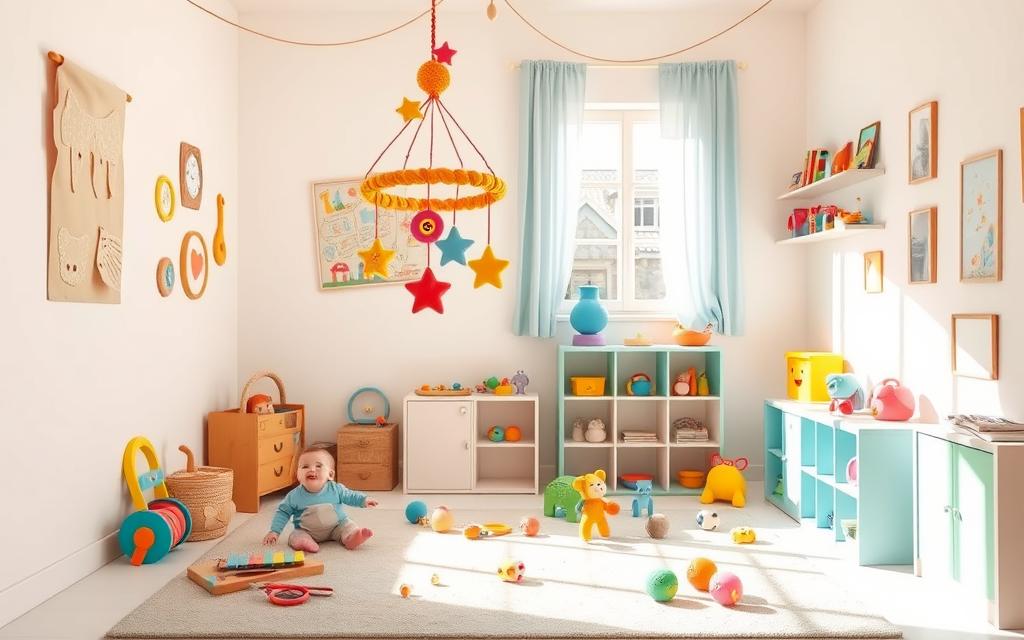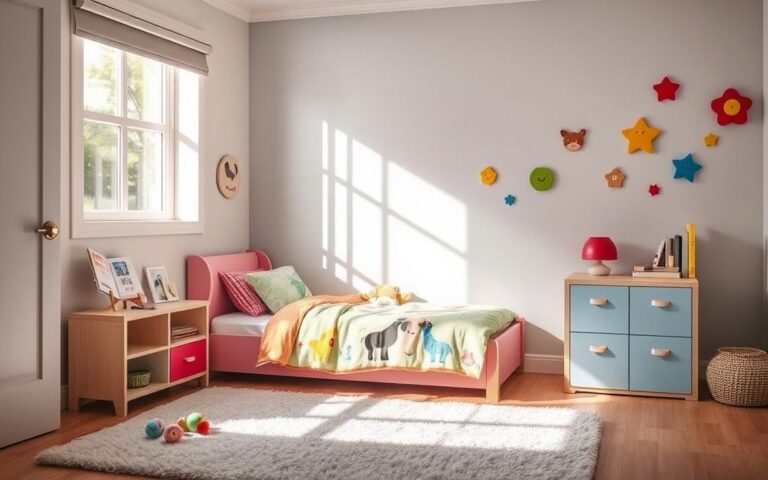Melodies for Babies: Tips for Adding Music to Your Little One’s Day

Adding music to a baby’s day can greatly improve their development. It boosts their thinking skills and emotional health. Music is key for a baby’s growth, helping them love music for life.
Music is a powerful tool for babies. It wakes up their senses, helps them learn, and brings calm. Playing soft tunes during nap time or singing during play can be a great start.
Music offers many benefits for babies. It helps them develop rhythm, timing, and coordination. It also brings peace and calm, perfect for nap or bedtime.
Key Takeaways
- Incorporating music into baby’s daily routine can have a profound impact on their development
- Music can help to improve cognitive skills and enhance emotional well-being
- The importance of music for baby development is well-documented
- Baby music benefits include improved rhythm, timing, and coordination
- Incorporating music into baby’s daily routine can be as simple as playing soothing melodies during nap time
- Music can help to create a sense of calm and relaxation, making it an essential tool for parents to use during nap time or bedtime
Understanding the Power of Music in Early Development
Music is key in a baby’s early growth. It’s important to know how to introduce music to support their development. Studies show music boosts a baby’s thinking, feeling, and social skills.
Music helps a baby’s brain grow. It improves memory, language, and spatial skills. It also helps with emotional intelligence, which is vital for relationships and stress management. Activities like singing lullabies, playing instruments, and musical games are great.
Introducing music to a baby should be fun and engaging. Start by playing soothing tunes during pregnancy. Then, expose them to various music styles after birth. Here are more ways to include music in a baby’s life:
- Playing musical instruments, such as a baby-friendly drum or xylophone
- Singing songs and reciting nursery rhymes
- Engaging in musical games, such as pat-a-cake and peek-a-boo
By making music a daily part of their lives, parents can foster a lifelong love for music. This supports their overall growth. Whether it’s through therapy or just playing music at home, music’s benefits for babies are clear.
The Science Behind Baby’s Musical Reception
Creating a musical environment for babies is key for their growth. It introduces them to various melodies and rhythms early on. Studies show babies can tell apart different musical patterns. This skill grows when parents sing to them.
Singing to babies boosts their brain and emotional health. It makes them feel safe and comforted. This is why singing is so important for their development.
To make a musical space for babies, play soft music during sleep, sing lullabies, and use musical toys. Singing to babies has many benefits. It can improve their language, memory, and social skills. Music in a baby’s daily life lays a strong foundation for their future.
- Play music during daily activities, such as bath time or mealtime
- Sing to your baby regularly, using different tones and pitches
- Use musical instruments, such as a baby-friendly drum or maracas, to stimulate their senses
By following these tips, parents can create a musical space that supports their baby’s growth. It also fosters their love for music.
Essential Tools for Creating a Musical Environment at Home
Setting up a musical space at home is fun for parents and babies. It helps babies grow in many ways. Music can also calm and comfort them.
There are key tools and resources for a musical home. These include:
- Age-appropriate musical instruments, such as baby-safe drums and xylophones
- Digital music resources, such as baby music apps and streaming services
- Sound-rich nursery decorations, such as music-themed wall art and mobiles
Age-Appropriate Musical Instruments
Choosing the right instruments for your baby is important. Look for safe and easy-to-use ones, like soft drums and xylophones.
Digital Music Resources for Babies
Digital music can offer many musical experiences for your baby. Find baby music apps and streaming services with soothing and stimulating music.
Creating a Sound-Rich Nursery
A sound-rich nursery can stimulate your baby’s senses. Choose music-themed decorations, like wall art and mobiles, to enhance the nursery’s musical feel.
Incorporating Music into Baby’s Daily Routine
Music is a powerful tool that can greatly impact a baby’s development. Incorporating music into baby’s daily routine supports their growth. It stimulates their brain and improves their cognitive skills.
There are many ways to incorporating music into baby’s daily routine. You can play music during bath time or sing lullabies before bed. Other ideas include:
- Playing music during playtime to help stimulate their senses and encourage movement
- Using music to help soothe and calm your baby during times of stress or upset
- Creating a musical routine, such as playing a specific song or album at the same time each day
By incorporating music into baby’s daily routine, you support their development. It provides a fun and engaging way for them to learn and grow. The benefits include improved cognitive skills, enhanced creativity, and a stronger bond between parent and child.
Here is a table summarizing some of the key baby music benefits:
| Benefit | Description |
|---|---|
| Improved Cognitive Skills | Music can help to stimulate brain development and improve cognitive skills |
| Enhanced Creativity | Music can help to encourage creativity and self-expression |
| Stronger Bond | Music can help to create a stronger bond between parent and child |
Morning Musical Rituals for a Happy Start
Starting the day with music can make it happier and more engaging. How to introduce music to baby is a key question. Morning music rituals can help your baby grow and love music forever.
Wake-up Songs and Melodies
Wake-up songs and melodies are perfect for gently waking your baby. Choose songs that are soft and soothing, or something lively to wake them up. This sets a positive start to their day.
Musical Breakfast Time Activities
Musical activities during breakfast are fun and educational. Best baby music activities include singing songs with actions and playing instruments. You can also make a playlist for breakfast. Music can even make mealtime exciting and encourage trying new foods.
Music in the morning makes your baby’s day happier and more engaging. It’s great for learning and development. Whether it’s through songs or breakfast activities, music is a wonderful part of their daily routine.
| Activity | Benefits |
|---|---|
| Wake-up songs and melodies | Helps to gently wake baby, stimulates development |
| Musical breakfast time activities | Promotes learning and development, encourages trying new foods |
Using Music During Playtime Adventures
When incorporating music into baby playtime, parents can make playtime more fun and engaging. Music can stimulate a baby’s senses, encouraging them to explore and interact. It also helps babies feel secure and calm, even in new places.
Parents can sing songs, play musical instruments, or use music to enhance sensory play. For instance, they can have a dance party with upbeat music or create a calming atmosphere during bath time. This way, babies develop a love for music and a strong foundation for learning.

- Choose calming music with a slow tempo and gentle melody
- Use music to create a consistent routine, such as during feeding or bedtime
- Encourage baby to move and groove to the music, promoting physical development and bonding
By incorporating music into baby playtime and using music to soothe baby, parents create a nurturing environment. This supports their baby’s overall development and well-being.
Soothing Melodies for Naptime and Bedtime
Creating a musical environment for babies is key for their growth. Singing to them helps a lot. It makes a calm space, ideal for sleep.
For lullabies, pick songs that are soft and gentle. Favorites like “Twinkle, Twinkle, Little Star” and “Hush Little Baby” work well. Sing them slowly to make the atmosphere calm.
Lullaby Selection Tips
- Choose lullabies with a slow and steady beat
- Select songs with simple and repetitive melodies
- Sing in a soft and gentle voice
Creating a Calming Musical Atmosphere
To make a calm musical space, play soothing music softly during sleep times. This helps your baby relax and sleep quicker. You can also use white noise or nature sounds for a peaceful vibe.
Adding soothing melodies to your baby’s day can spark a love for music. It also helps them relax and sleep better. Always keep your baby’s needs first and adjust as they grow.
| Lullaby | Tempo | Mood |
|---|---|---|
| Twinkle, Twinkle, Little Star | Slow | Calm |
| Hush Little Baby | Gentle | Soothing |
Musical Games and Activities for Development
Music therapy for infants is a great way to promote learning and development. It’s as simple as singing a lullaby or playing a musical instrument. Musical games and activities can stimulate a baby’s senses, improve cognitive skills, and enhance motor skills.
Rhythm and Movement Exercises
Rhythm and movement exercises are key for a baby’s development. They help improve coordination, balance, and physical fitness. For instance, clapping hands or tapping feet to a beat can teach a baby rhythm and timing.
Simple Musical Games for Babies
Simple musical games like “Pat-a-Cake” or “The Wheels on the Bus” are great for babies. They improve cognitive skills like memory and attention. They also enhance social skills, such as communication and interaction.
Interactive Musical Story Time
Interactive musical story time combines music, movement, and storytelling. It boosts a baby’s language skills, imagination, and creativity. For example, reading a book with a musical theme, like “The Itsy Bitsy Spider,” engages a baby in musical activities while promoting learning and development.
Making the Most of Music Classes and Groups
Music classes and groups are great for incorporating music into baby’s daily routine. They help with learning and growing. Babies get to enjoy socializing, thinking better, and feeling more.
Some benefits of music classes and groups include:
- Enhanced cognitive development through musical patterns and rhythms
- Improved social skills through interaction with other babies and caregivers
- Emotional growth through expression and exploration of emotions
When picking a music class or group, think about these things:
- Age and developmental stage of the baby
- Qualifications and experience of the instructor
- Style and structure of the class
By incorporating music into baby’s daily routine through music classes and groups, parents can give their babies a fun way to learn. Music classes and groups are getting more popular because of their many baby music benefits.
Every baby is different, and what works for one might not work for another. Be patient. With time, you’ll find the right music class or group for your baby’s needs and personality.
| Age | Music Class Style | Benefits |
|---|---|---|
| 0-6 months | Lullaby and soothing music | Calming and sleep promotion |
| 6-12 months | Interactive and playful music | Cognitive development and socialization |
Choosing the Right Music for Different Ages and Stages
Choosing the right music for your baby is key. It should match their age and developmental stage. This can be tricky, but with some tips, you can create a musical space that helps them learn and grow. To introduce music to your baby, consider the following age groups and their musical needs.
Newborn to 3 Months
For newborns to 3 months, soft and calming music is best. Think lullabies, white noise, and nature sounds. Playing calming music during feeding or sleep is a great best baby music activity for this age.
4 to 8 Months
For babies 4 to 8 months, introduce music with a stronger beat. This includes children’s songs, nursery rhymes, and baby-friendly instrumental music. Fun best baby music activities include clapping hands or tapping feet to the beat.
9 to 12 Months
For babies 9 to 12 months, introduce music with various instruments and sounds. Think children’s music with guitars, drums, and other kid-friendly instruments. Engaging best baby music activities include singing along to favorite songs or playing with musical toys.
By picking the right music for your baby’s age and stage, you create a musical space that’s fun and educational. Always keep the music gentle and enjoyable. Engage with your baby during musical activities.
| Age Group | Music Type | Activities |
|---|---|---|
| Newborn to 3 Months | Gentle and Soothing | Playing calming music during feeding or sleep time |
| 4 to 8 Months | Stronger Beat and Rhythm | Clapping hands or tapping feet to the beat |
| 9 to 12 Months | Variety of Instruments and Sounds | Singing along to favorite songs or playing with musical toys |
Common Mistakes to Avoid When Introducing Music
When incorporating music into baby’s daily routine, it’s key to avoid common mistakes. One big error is overstimulation, which can actually harm the benefits of music. To make a soothing atmosphere, think about the volume and type of music you play.
Don’t let music play all day as background noise. Instead, use it to make special moments better, like during play or naptime. This way, your baby will learn to love music more. Here are some tips:
- Keep the volume low to prevent overstimulation
- Choose music with a consistent rhythm and melody
- Use music to create a sense of routine and predictability
By paying attention to these tips, you can make music a big part of your baby’s day. This will help them grow to love music all their life.
| Mistake | Correction |
|---|---|
| Overstimulation | Keep the volume low and use music intentionally |
| Irregular music exposure | Establish a routine that includes music at specific times |
| Ignoring baby’s preferences | Observe and respond to your baby’s reactions to different types of music |
Conclusion: Nurturing Your Baby’s Musical Journey
Adding music to your baby’s day can be a great way to help them learn and grow. By introducing them to different sounds, you support their brain and emotional health. You also help them develop social skills.
There’s no single way to introduce music to your baby. Try out various genres, instruments, and activities to see what they like. Whether it’s singing lullabies, playing musical games, or creating a sound-filled nursery, make music a fun part of their life.
Starting this musical journey with your baby is exciting. Enjoy the moments, keep the memories, and watch as their love for music grows. It will become a lifelong passion.






